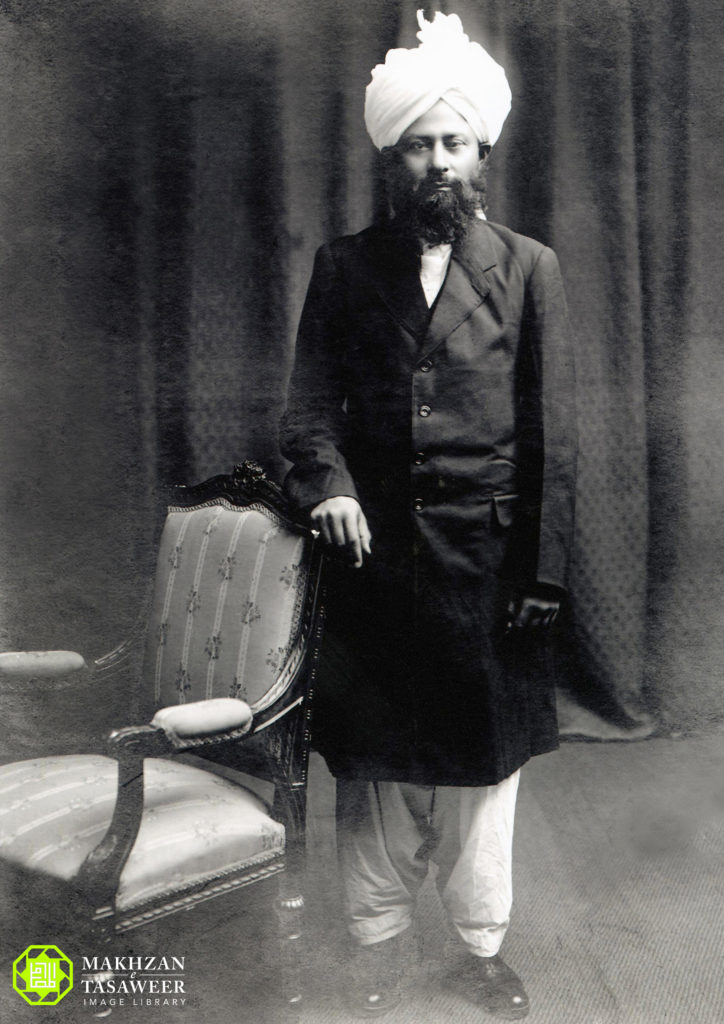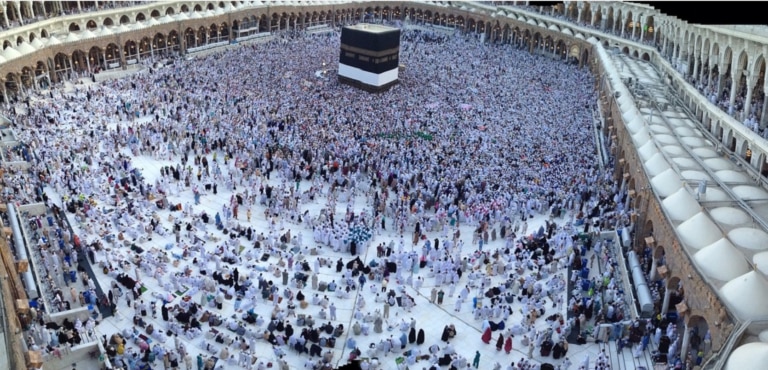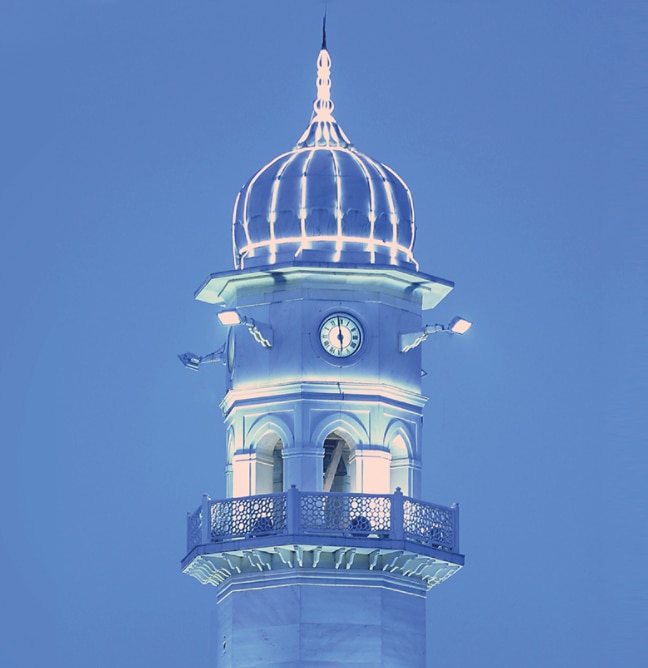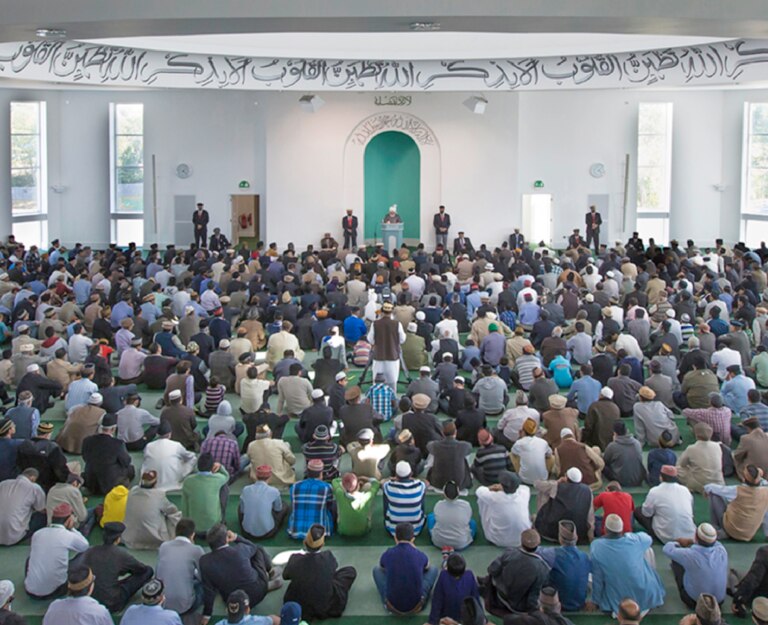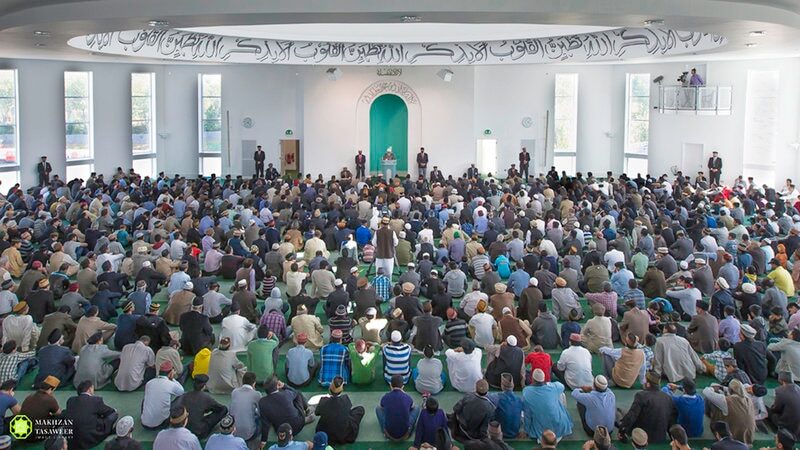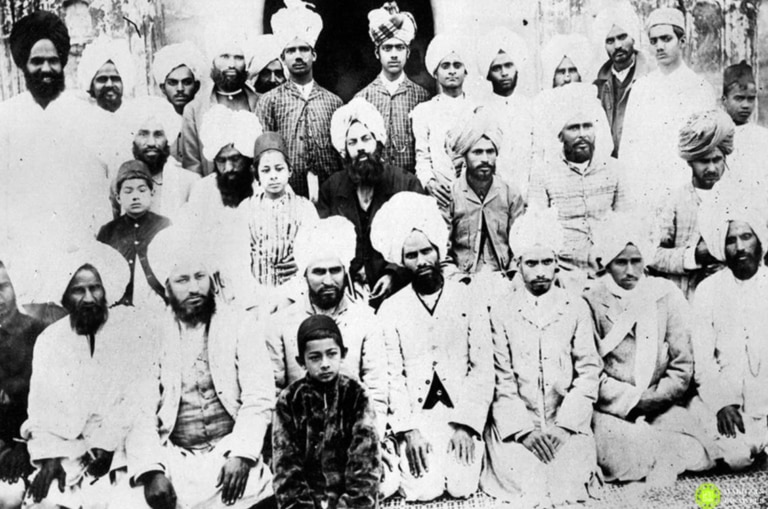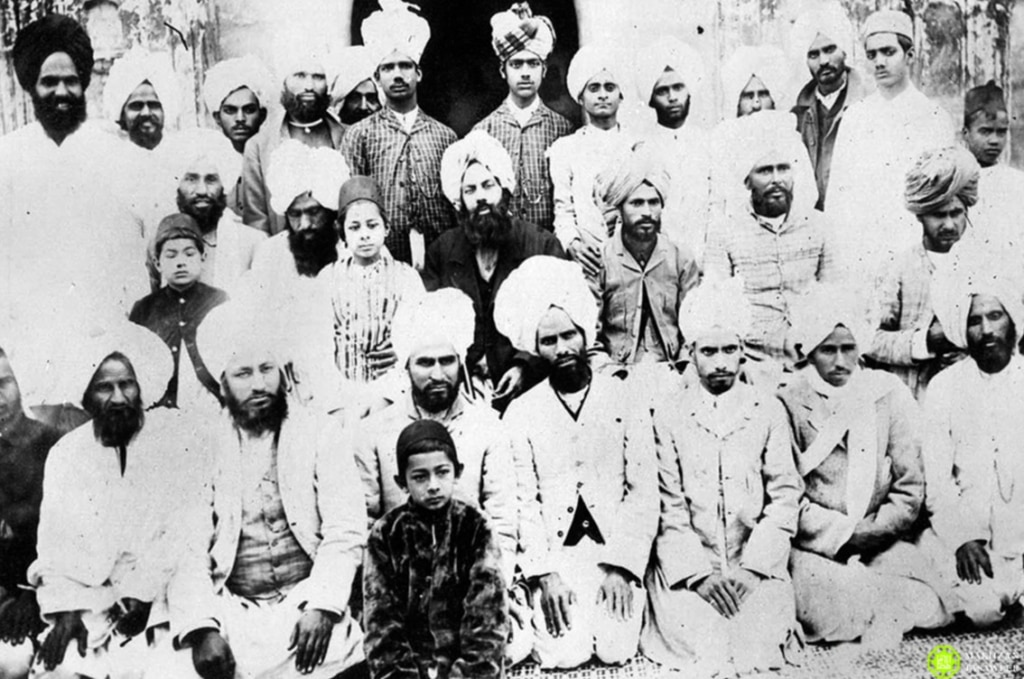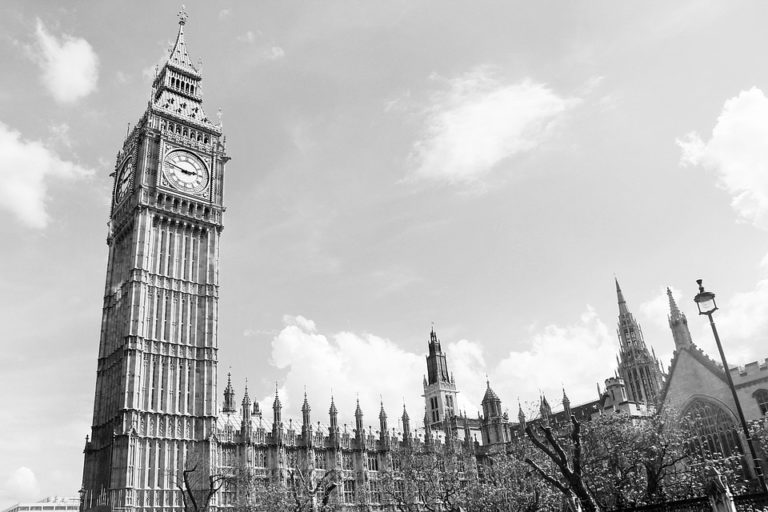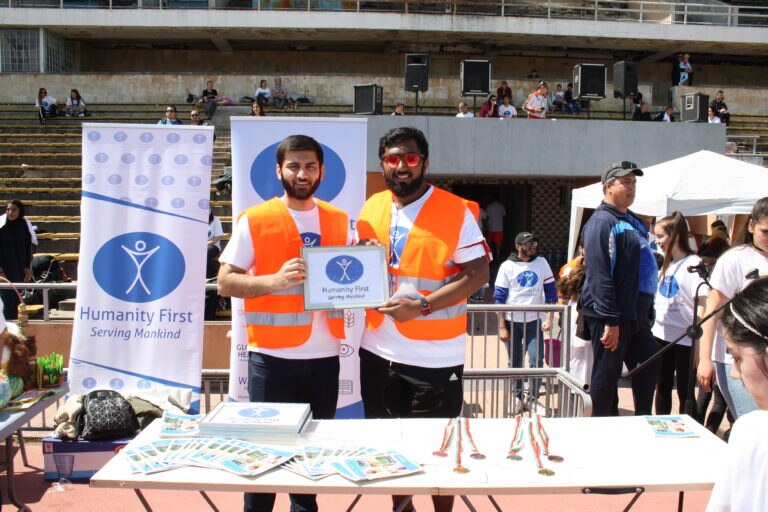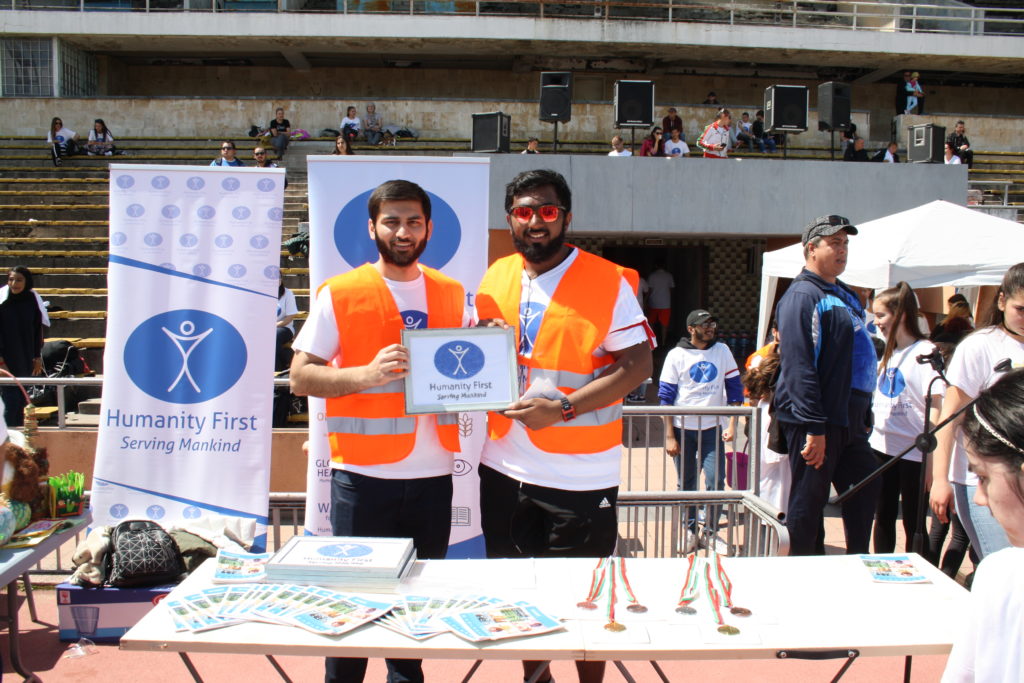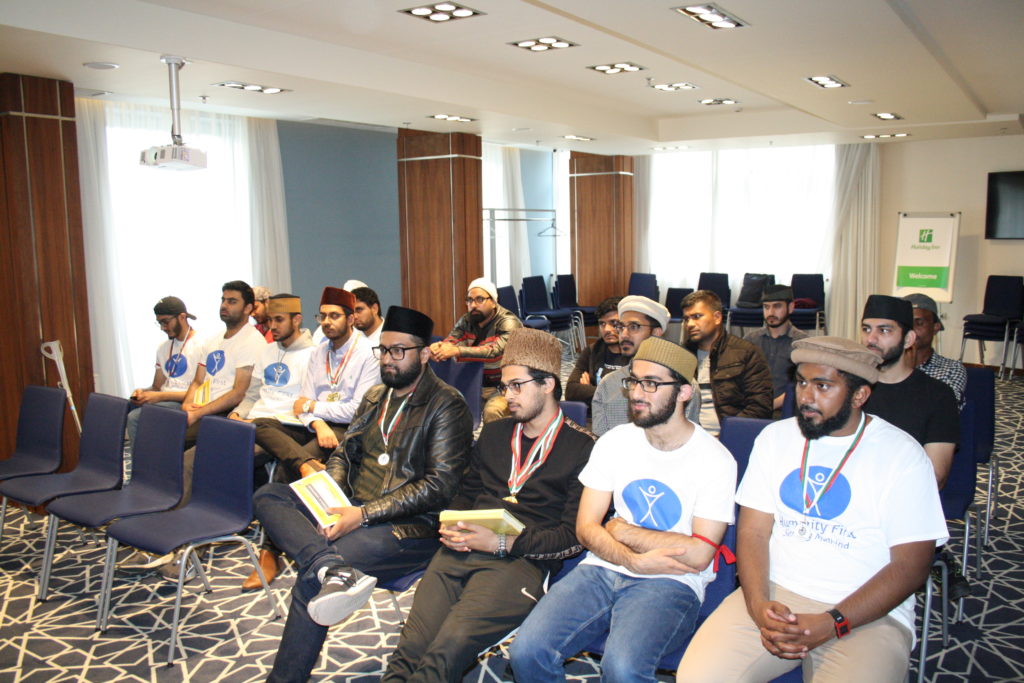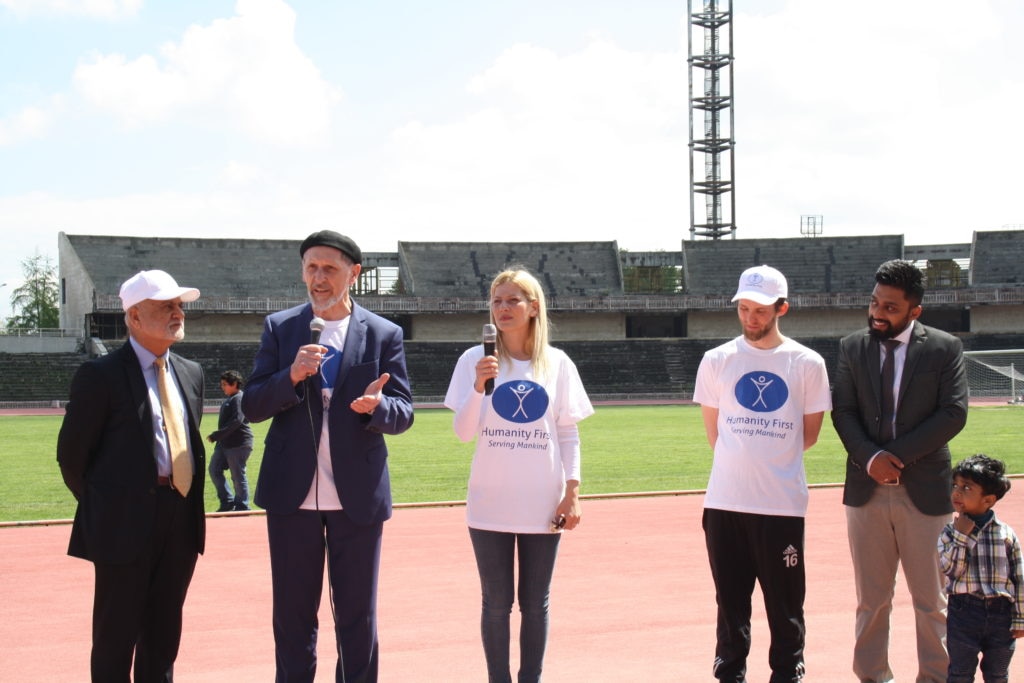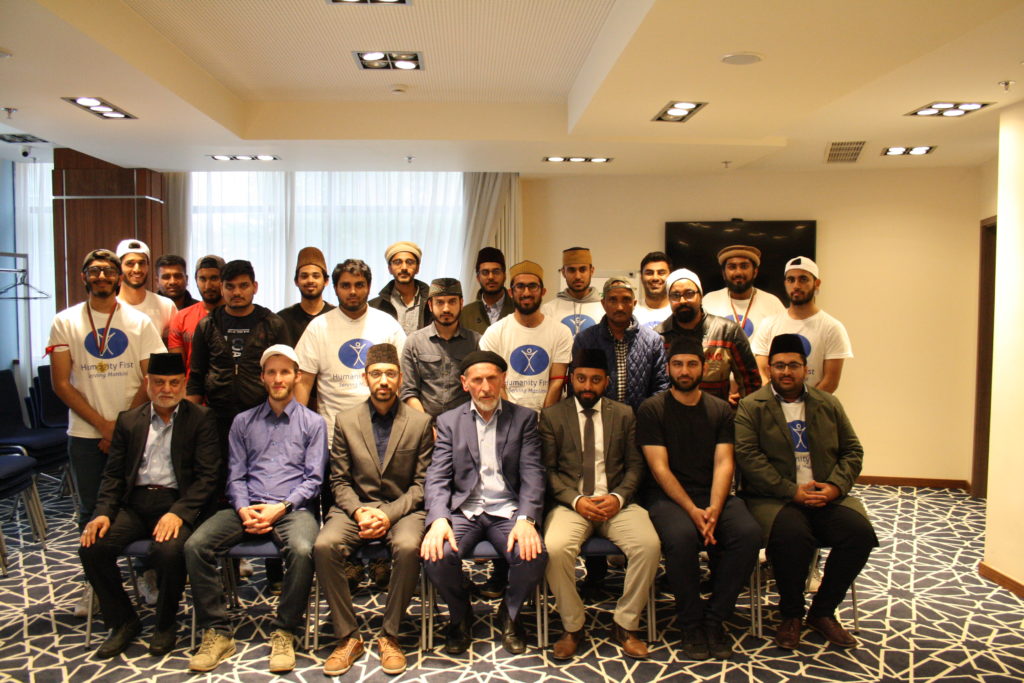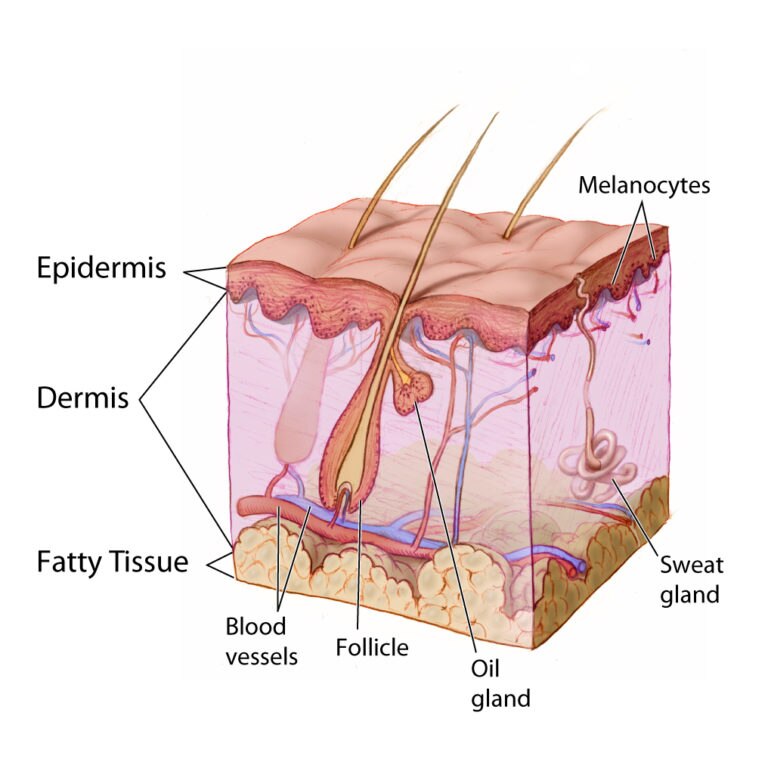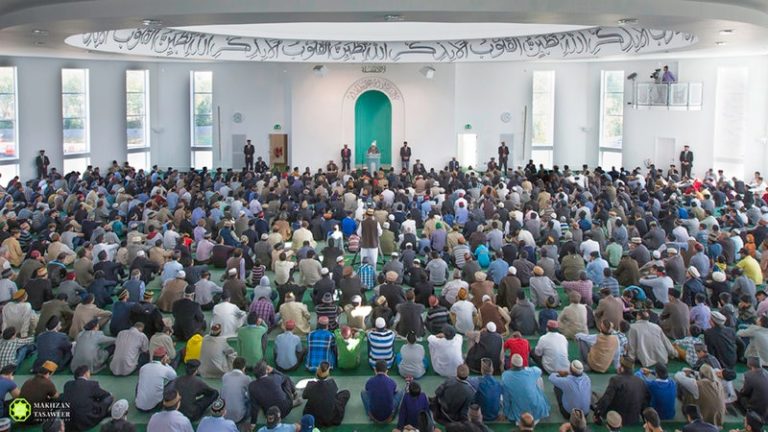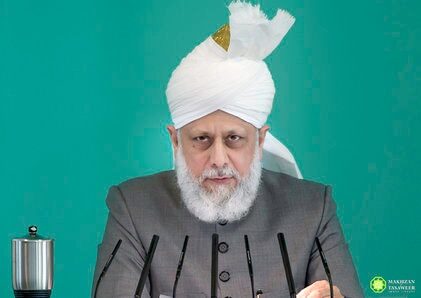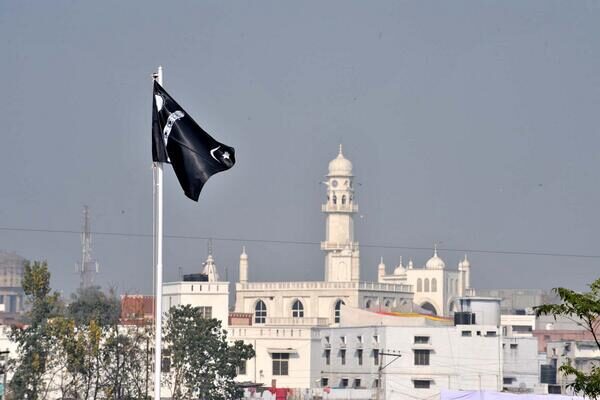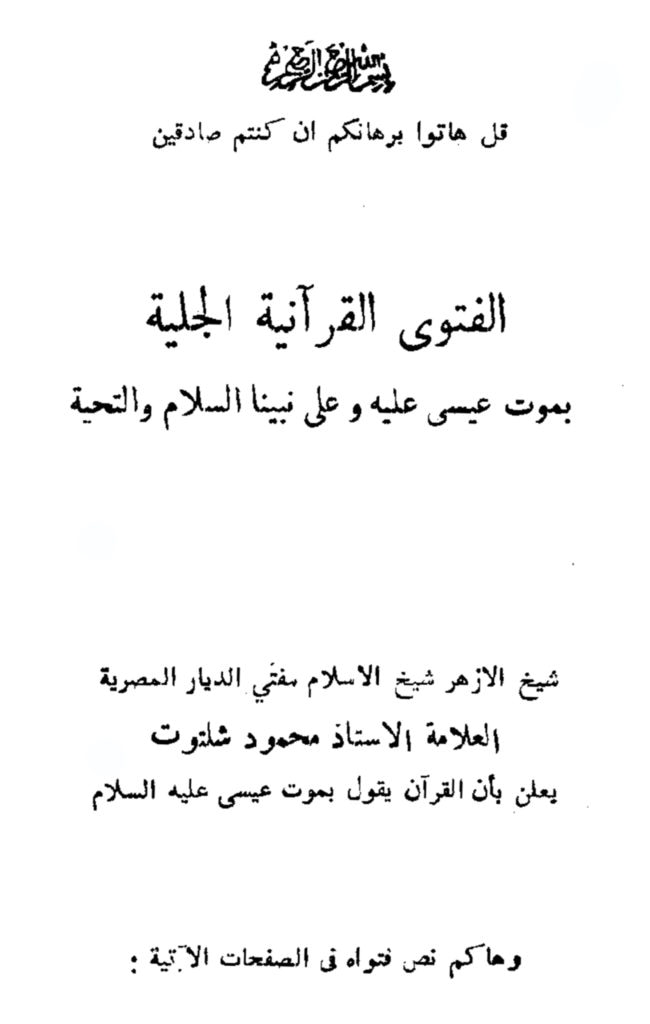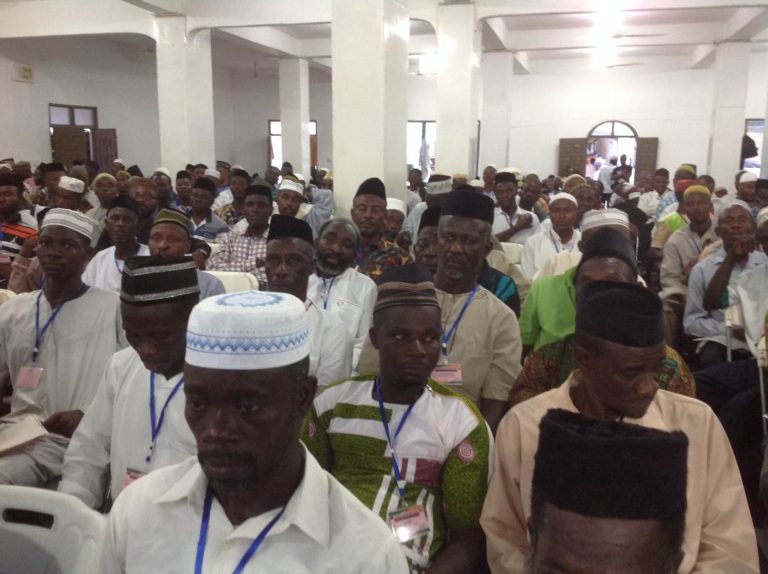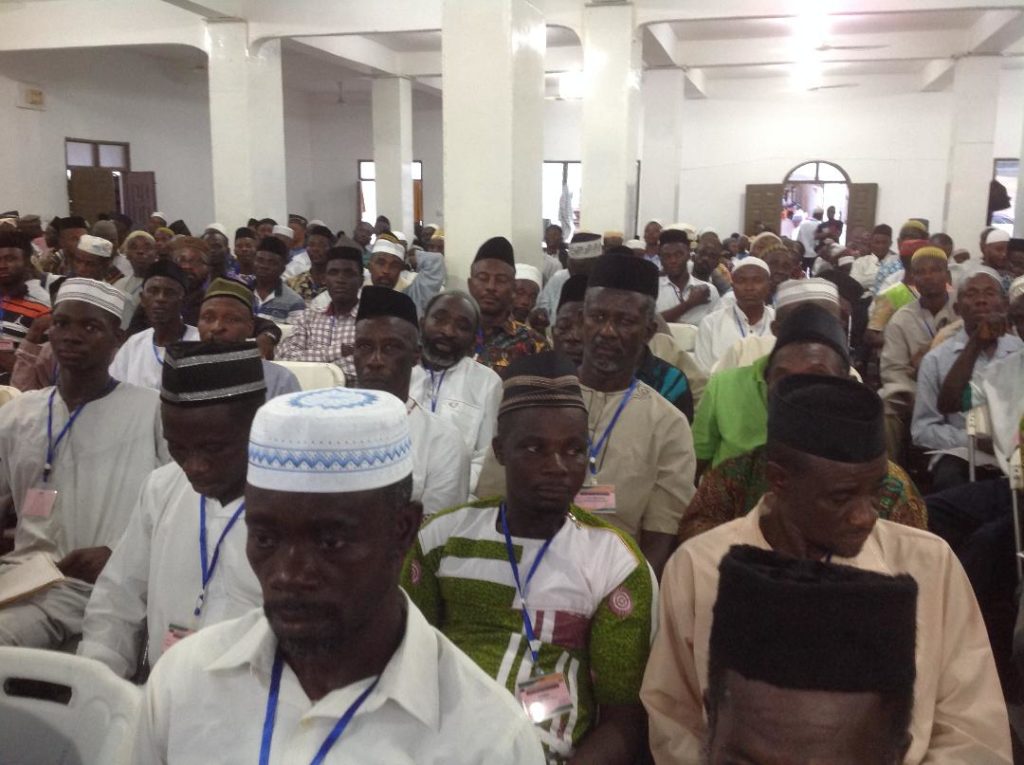Friday Sermon
12 April 2019
Delivered from Baitul Futuh Mosque
Men of Excellence
After reciting the Tashahud, Ta‘awuz, and Surah al-Fatihah, Hazrat Khalifatul Masih Vaa stated:
The
first of the Badri Companions that I will mention today is Hazrat Hussainra
bin Haris. His mother’s name was Sukhaila bint Khuzai. Hazrat Hussainra
bin Haris belonged to Banu Muttalib bin Abdi Manaaf tribe. He migrated to
Medina along with his two brothers, Hazrat Tufailra and Hazrat
Ubaidahra. Hazrat Mistahra bin Asasah and Hazrat Abbaadra
bin Muttalib also accompanied them. While in Medina, he stayed at the house of
Hazrat Abdullah bin Salama Ajlaani. According to a narration by Muhammad bin
Ishaq, the Holy Prophetsa established a bond of brotherhood between Hazrat
Hussainra and Hazrat Abdullahra bin Jubair. Hazrat
Hussainra participated in all of the battles alongside the Holy
Prophetsa including the battles of Badr and Uhud. The two brothers
of Hazrat Hussainra – Hazrat Ubaidahra and Hazrat Tufailra
– also participated in the Battle of Badr. Hazrat Hussainra passed
away in 32 AH. (Al-Tabaqaat-ul-Kubra li ibn Sa‘d, Vol. 3, p. 30, Hussain
bin Haris, Dar-ul-Hayaa al-Turath Al-Arabi, Beirut, Lebanon, 1996) (Al-Isti’ab
fi Ma’rifatis Sahaba, Vol. 3, p. 141, Ubaida bin Haris, Dar-ul-Kutb
Al-Ilmiyyah, Beirut, Lebanon, 2002) (Usdul Ghaba, Vol. 1, p. 573,
Hussain bin Haris, Dar-ul-Kutub Ilmiyyah, Beirut)
The name
of Hazrat Hussain’s son was Abdullah, while his daughters were Khadija and
Hind, all of whom accepted Islam. At the occasion of the Battle of Khayber, the
Holy Prophetsa gave grains weighing 100 wasaq to both of
them. (Al-Tabaqaat-ul-Kubra li ibn Sa‘d, Vol. 3, p. 30, Hussain bin
Haris & Vol. 8, p. 364, Dar-ul-Hayaa al-Turath Al-Arabi, Beirut, Lebanon,
1996),
1 wasaq equals 60 saa, and 1 saa is equal to 2.5 kg. Thus, the Holy Prophetsa gave them grains weighing almost 375 maund [equivalent to about approximately 13,500 kg] due to the Holy Prophet’s regard for their father. (Lughatul Hadith, Vol. 4, p. 487, “Wasaq” & Vol. 2, p. 648, “Saa, Nashir Numani Kutub Khana, Lahore, 2005)
The next companion is Hazrat Safwanra. His father’s name was Wahab bin Rabi‘ah. The title of Hazrat Safwanra was Abu Amr. He belonged to the tribe of Banu Haris bin Fehr. His father’s name was Wahab bin Rabi‘ah. In one of the narrations, his father’s name has also been recorded as “Uhaib”. His mother’s name was Da’ad bint Hajdam, who was more commonly known as “Baidaa”. For this reason, Hazrat Safwanra was also referred to as Ibn Baidaa [the son of Baidaa]. He was the brother of Hazrat Sahlra and Hazrat
Suhailra. These two brothers are different from Sahl and Suhail,
from whom the Holy Prophetsa bought a plot of land for
Masjid-e-Nabawi. The Holy Prophetsa established a bond of
brotherhood between Hazrat Safwanra and Hazrat Rafey bin Muallara.
According to another narration, the bond was established with Hazrat Rafey bin
Ajlaanra. There are varying opinions regarding his demise. According
to some, he was martyred by Tuaimah bin Adi during the Battle of Badr.
According to another narration he was not martyred during the Battle of Badr,
rather he participated in all of the battles alongside the Holy Prophetsa
including the Battle of Badr.
With
regards to Hazrat Safwanra, it is also reported in one narration
that he returned to Mecca after the Battle of Badr and after some time returned
to Medina. We also find a narration which states that he stayed in Mecca until
the Victory of Mecca. Hazrat Ibn Abbasra narrates that the Holy
Prophetsa included him in the expedition of Abdullah bin Jahsh and
sent him towards Abwaa. According to various narrations, he is reported to have
passed away in 18 AH, 30 AH or 38 AH. (Usdul Ghaba, Vol. 3, p. 33,
Safwan bin Wahab, Dar-ul-Kutub Ilmiyyah, Beirut) (Al-Asaab fi Tameez
Al-Sahaba, Vol. 3, pp. 358-359, Safwan bin Wahab, Dar-ul-Kutb Al-Ilmiyyah,
Beirut, 1995) (Al-Tabaqaat-ul-Kubra li ibn Sa‘d, Vol. 3, p. 318, Safwan
bin Baidha, Dar-ul-Kutb Al-Ilmiyyah, Beirut, 1990)
In any
case, it is evident from all the aforementioned narrations that he was a BadriCompanion.
The next
companion to be mentioned is Hazrat Mubashirra bin Abd-il-Munzir.
His father’s name was Abd-ul-Munzirra and his mother’s name was
Nasiba bint Zaid. He belonged to Banu Amr bin Auf clan of the Aus tribe. The
Holy Prophetsa formed a bond of brotherhood between Hazrat Mubashir
bin Abd-il-Munzirra and Hazrat Aqil bin Abu Bukairra.
According to some narrations the Holy Prophetsa formed a bond of
brotherhood between Hazrat Aqil bin Abu Bukairra and Hazrat Mujazzarra
bin Ziad. Nevertheless, Hazrat Mubashirra participated in the Battle
of Badr and was martyred during the battle. Hazrat Sa‘ibra bin Abu
Lubaba – who was the son of Hazrat Mubashir’sra brother, Hazrat Abu
Lubabara – narrates that the Holy Prophetsa allotted a
share of the spoils of war to Hazrat Mubashirra bin Abd-il-Munzir
and Ma‘an bin Adi brought his share to us. (Al-Tabaqaat-ul-Kubra li ibn Sa‘d,
Vol. 3, pp. 248-347, Mubashir bin ‘Abd-il-Munzir, Dar-ul-Hayaa al-Turath
Al-Arabi, Beirut, Lebanon, 1990)
His
brother and his nephews also received a share from the spoils of war.
At the
time of the migration to Medina, from among the Muhajireen [those Muslims who
had migrated to Medina from Mecca], Hazrat Abu Salamara bin
Abd-il-Asad, Hazrat Amir bin Rabiahra, Hazrat Abdullah bin Jahashra
and his brother Hazrat Abu Ahmadra bin Jahash, stayed with Hazrat
Mubashir bin Abd-il-Munzirra at Quba. Following this, the Muhajireen
started arriving there in large numbers. (Al-Sira Al-Nabwaiyyah Li ibn
Hisham, p. 335, Zikr Muhajireen ilaa Al-Medina, Dar-ul-Kutub Al-ilmiyyah,
Beirut, 2001)
Hazrat
Mubashir bin Abd-il-Munzirra participated in the Battle of Badr
along with his two brothers, Hazrat Abu Lubaba bin Abdil Munzirra
and Hazrat Rifa‘ah bin Abd-il-Munzirra. Hazrat Rifa‘ahra
participated in the pledge at Aqba along with seventy companions and he also
participated in the battles of Badr and Uhud. He was martyred on the day of
Uhud.
When the
Holy Prophetsa set off for the Battle of Badr, he appointed Hazrat
Abu Lubabara as the administrator of Medina and sent him back from
Rauha. As has previously been mentioned, Rauha is the name of a place located
at a distance of 40 miles from Medina. However, the Holy Prophetsa
allotted a share for him from the spoils of war. Allama Ibn Ishaq states that
Hazrat Mubashir bin Abd-il-Munzirra belonged to Banu Amr bin Auf
tribe. He was among the Ansari companions [Muslims native to Medina] who were
martyred during the Battle of Badr. (Usdul Ghaba Fi Marifat Al-Sahaba,
Pt. 5, Mubashir bin Abd-il-Munzir, p. 53, Dar-ul-Kutb Al-Ilmiyyah, Beirut,
Lebanon, 2008) (Al-Tabaqaat-ul-Kubra, Pt. 3, p. 241, Mubashir bin
‘Abd-il-Munzir, Dar-ul-Hayaa al-Turath Al-Arabi, Beirut, Lebanon, 1996) (Lughatul
Hadith, Vol. 2, p. 149)
Hazrat
Abdullah bin Amr bin Haram relates, “I saw a dream before the battle of Uhud
that Hazrat Mubashir bin Abd-il-Munzirra is saying to me that I will
join them in a few days. I asked him, ‘Where are you?’ Upon this, he replied,
‘We are in heaven. We eat and drink wherever we desire.’ I asked him, ‘Were you
not martyred during the Battle of Badr?’ He replied, ‘Indeed, I was certainly
martyred, however, I was revived once again.’”
This
companion related this dream to the Holy Prophetsa, upon which the
Holy Prophetsa said, “O Abu Jabir! This is the reality of
martyrdom.” (Al-Mustadrak Ala Al-Sahihain, Vol. 5, pp. 1840-1841, Kitab
Marifat Al-Sahaba, Zikr Manaqib Abdillah bin Amr, Maktaba Nizar Mustapha,
Mecca, 2000)
A martyr
returns to Allah and is granted the freedom to do as he desires.
Whilst
mentioning the companions that were martyred during the Battle of Badr, Allama Zarqani
writes that two companions belonged to the tribe of Aus out of which one was
Hazrat Saad bin Khaithamara. Some are of the opinion that Tuaima bin
Adi martyred him, whereas others claim that Amr bin Abdi Wudd martyred him.
Samhudi has written in his book Wafa that according to the historians it
is said that apart from Hazrat Ubaidara, all of the companions that
were martyred during the Battle of Badr were also buried there. Hazrat Ubaida
passed away a little later and as such, he was buried in Safra or Rauha.
In light
of the authentic narrators, Tibrani has related an incident on the authority of
Ibn Masud in which he states, “God will most certainly place the souls of the
companions of the Holy Prophetsa that were martyred on the day of
Badr among the green birds of heaven and they will eat and drink therein
wherever they please. They will be in this very state when their Lord will
appear before them and say to them, ‘O My servants! What do you desire?’ Upon
this, they will say, ‘O our Lord! Is there anything greater than the fact that
we have already entered heaven?’ God Almighty will then ask, ‘What is it that
you desire?’ On the fourth occasion of asking, the companions would say,
‘Return our souls to our bodies, so we can be martyred again in the same manner
as we were martyred before.’” (Sharh Al-Allama Al-Zurqani, Pt. 3, p.
327, Baab Ghazwah-e-Badr Al-Kubra, Darul Kutub al-Ilmiyyah, Beirut, Lebanon,
1996)
The next
companion to be mentioned is Hazrat Warqa bin Ayasra. There is a
difference of opinion about his name. Other than “Warqa”, his name has also
been recorded as “Wadfa” and “Wadqa”. His father’s name was Ayas bin Amr. He
was from the Banu Lozaan bin Ghanam clan of the Khazraj tribe. According to a
narration by Allama bin Ishaaq, Hazrat Warqa had the opportunity to participate
in the Battle of Badr along with two of his brothers, Hazrat Rabeera
and Hazrat Amrra. Apart from the Battle of Badr, Hazrat Warqara
participated in the Battle of Uhud, the Battle of Khandaq and all other battles
alongside the Holy Prophetsa. He was martyred in 11 AH in the Battle
of Yamama during the Caliphate of Hazrat Abu Bakrra. (Al-Sira
Al-Nabwaiyyah Li ibn Hisham, p. 469, Dar-ul-Kutub Al-ilmiyyah, Beirut,
2001) (Usdul Ghaba, Vol. 5, pp. 412-413, Warqa bin Ayas, Dar-ul-Kutub
Al-ilmiyyah, Beirut, 2008) (Al-Asaab fi Tameez Al-Sahaba, Vol. 6, p.
471, Warqa bin Ayas, Dar-ul-Kutb Al-Ilmiyyah, Beirut, 2005)
The next
companion that will be mentioned is Hazrat Muhriz bin Nadhlahra. His
father’s name was Nadhlah bin Abdullah, but according to another narration, his
father’s name was Wahab. His title was Abu Nadhlah. He had a fair complexion
and a beautiful countenance. He was also known by the titles of Fuhaira and
Akhram. He was a confederate of the Banu Abd Shams whereas Abdul Al-Ash‘al
tribe have claimed to be his confederates as well. Hazrat Muhrizra
was known as Muhriz or Akhram and he was from a Meccan tribe called Banu Ghanam
bin Dudan which later accepted Islam.
After
accepting Islam, the women and men of this tribe were able to migrate to
Medina, and Hazrat Muhriz bin Nadhlahra was amongst these migrants.
Waaqdi states: “I heard from Ibrahim bin Ismail that on the Day of Sarh (this
is the name of the Battle of Zee Qard also known as the Battle of Al-Ghabah
which took place in 6 AH) other than Hazrat Muhrizra bin Nadhlah, no
one from the house of Banu Abd Al-Ash‘al participated in it. He was riding
Hazrat Muhammad bin Maslamah’s horse and the name of this horse was
Dhul-Lama’.”
The Holy
Prophetsa had established a bond of brotherhood between Hazrat
Muhrizra bin Nadhlah and Hazrat Umarahra bin Hazam.
According to Waqadi, he participated in the Battle of Badr, Uhud and Khandaq.
Salih bin Qisaan narrates that Hazrat Muhrizra bin Nadhlah said, “I
saw in a dream that the heavens were made to open up for me and I entered and
reached the seventh heaven. Then I arrived at the Sidratul Muntaha [farthest
Lot-tree]. It was then revealed to me that this was my destination.” Hazrat
Muhrizra further states, “I mentioned this dream to Hazrat Abu Bakrra
who was an expert in the interpretation of dreams. Hazrat Abu Bakrra
stated, ‘Rejoice at the glad tidings of martyrdom.’” Subsequently, after this
dream, he attained martyrdom.
Hazrat
Muhrizra set off on the Day of Sarh alongside the Holy Prophetsa
for the Battle of Al-Ghabah, also known as Ghazwah Zi Qard which took place in
6 AH. Amr bin Usman Jahshi narrates an incident from his forefathers:
“Hazrat
Muhriz bin Nadhlahra was thirty-one or thirty-two years old when he
participated in the Battle of Badr, and at the time of his martyrdom, he was
approximately 37 or 38 years of age.” (Al-Tabaqaat-ul-Kubra li ibn Sa‘d,
Pt. 3, Vol. 3, p. 52, Muhriz bin Nadhlah, Dar-ul-Hayaa al-Turath Al-Arabi, Beirut,
1996) (Usdul Ghaba Fi Marifat Al-Sahaba, Vol. 5, p. 68, Muhriz bin
Nadhlah, Dar-ul-Kutub Ilmiyyah, Beirut, Lebanon, 2008)
The
incident of his martyrdom is narrated as follows:
Hazrat
Ayasra bin Salama relates regarding the Battle of Zi Qard, “My father
informed me that after the Treaty of Hudaibiyah, we departed for Medina and
stopped at one place. There was a mount situated between us and the Banu
Lihyaan – an idolatrous tribe. The Holy Prophetsa prayed for the
person who would spend the night treading the mountain” i.e. the one who would
keep an eye out and stand guard for the Holy Prophetsa and the other
companions overnight, thus he would climb the mountain to ensure that no enemy
launched an attack. Hazrat Salama bin Akwa says, “In the evening, I climbed up
the mount two or three times. Later on we arrived at Medina.” He further says,
“The Holy Prophetsa sent his camels with Rabaah, who was a servant
of the Holy Prophetsa. I mounted Hazrat Talha’s horse and went with
him to allow the camels to drink water. In the morning, Abdur-Rahman Fazaari
attacked the camels of the Holy Prophetsa. There was an enemy tribe
with them and they stole the camels belonging to the Holy Prophetsa
and killed the shepherd.” The narrator further says: “I told Rabaah, ‘O Rabaah!
Take this horse to Talhah bin Ubaidullah and inform the Holy Prophetsa
that the idolaters had stolen his animals.’ I then stood on a sand-dune facing
Medina and repeated three times, Ya Sabaahahu, Ya Sabaahahu!”
The
Arabs used to proclaim these words if they saw an enemy return to attack again.
They would raise this as a slogan, connoting a cry for nearby forces to
assemble immediately and come to the army’s aid to take on the enemy and cause
them to flee. Some have said that it was a rule among the warriors that at
nightfall they would put down their arms and retire to their encampments – this
is another narration about the term Sabaahahu – and the next day it was
this call that would be made to let the armies know that it was morning and
they should prepare for battle once again. This explanation is found in Lughaat-ul-Hadeeth.
Nonetheless,
the narrator further states, “I followed in search of them, casting arrows at
them and repeating the couplet:
اَنَا
ابْنُ الْاَکْوَع وَالْیَوْمُ یَوْمُ الرُّضَّعِ
(Meaning,
“I am the son of Al-Akwa; today is the day where all the wretched shall
perish!”)
“And so,
each person I encountered from among the thieves, I would cast an arrow into
the camel carriage until the tip of the arrow reached the rider’s shoulder. I
would then say, ‘Take that! I am the son of Al-Akwa; today is the day where all
the wretched shall perish.’”
He goes
on, “I swear by God, I kept hitting them with arrows and injuring them, and if
any of the cavaliers rode towards me, I would head towards a tree and sit under
it, i.e. I would hide behind the tree and keep shooting arrows at the person
until he was injured. This continued until they reached a narrow passage in a
mount and entered it. I climbed on top of the mount and began throwing rocks at
them.”
The
people fleeing were the ones who looted the animals belonging to the Holy
Prophetsa all the while Hazrat Salamara was alone.
Initially, he pursued them with arrows, after which he says, “When I reached
the valley, I began throwing rocks, and I continued to pursue them like this
until there was no camel belonging to the Holy Prophetsa which had
not been saved…” meaning that because of the narrow valley, they had to leave
the animals behind. “…The thieves ran ahead, leaving the camels between them
and myself. I then continued to pursue them with arrows until they dropped more
than 30 blankets and over 30 spears to lighten their load. Meaning that the
people who were fleeing had already abandoned their camels, but were now also
leaving behind their belongings so that they could run with more ease.”
He
further says:
“Whatever
items they left behind, I kept placing a rock upon it as a sign so that the
Holy Prophetsa and his companions would recognise it. They kept
running until they reached a narrow valley in which they encountered one of the
sons of Badar Fazaari. They sat down and began eating, and I sat on a nearby
mount. Fazaari asked them, ‘Who was that man?’ They explained, ‘By God! This
man has troubled us a great deal. He has been continuously pursuing us since
morning, to the extent that he has taken everything from us.’” Badar Fazaari’s
son then advised that four of the thieves should go towards him. Hazrat Salmahra
recounts, “Four men from among them climbed the mount in my direction. When
they reached close enough to me that I could speak to them, I asked them, ‘Do
you know who I am?’ They answered, ‘No. who are you?’ I replied, ‘I am Salama,
the son of Akwa. I swear by Him Who has honoured the Holy Prophetsa
that I can overpower anyone from among you who I wish to. However, if any one
of you wishes to overpower me, he cannot do so.’ One of the four men who had
approached him became particularly frightened and said, ‘I think he is right.’
The four returned to their place and I remained sitting where I was until I saw
the horses of the Holy Prophetsa approaching from between the trees.
The first person I saw was Akhram Asadi, and behind him was Abu Qatadah Ansari,
and behind him was Miqdaad bin Aswad Kindi. I grabbed hold of the saddle of
Akhram, i.e. Hazrat Muhriz’s horse, and the enemies turned their backs and
dispersed in different directions.”
There is
some confusion here. It may seem as if the companions ran whereas it was
actually the thieves who had sat down to eat food, and when they saw that the
Muslims had drawn even closer to them, they turned their backs and ran away.
Hazrat Salamara further narrates, “I said, ‘O Akhram [meaning Hazrat
Muhriz], save yourself from them so they do not kill you, especially until the
Holy Prophetsa and his companions arrive for support.’
“He
replied, ‘O Salama! If you believe in Allah and the Day of Judgement, and you
know paradise is true and that the hellfire is a reality, then do not stand
between me and martyrdom.’ I left him, until Akhram and Abdur-Rahman engaged in
battle against each other. He injured Abdur-Rahman along with his horse, and
Abdur-Rahman threw a spear at Akhram, i.e. Hazrat Muhriz, and martyred him. He
then mounted his horse and turned to go back and join his own people. From
among those who were coming with the Holy Prophetsa, Abu Qatadah
pursued Abdur-Rahman. Abu Qatadah caught him and killed him with his spear, for
the reason that he had martyred Hazrat Muhrizra.”
Hazrat
Salamara further narrates, “I swear by Him Who has granted honour to
the Holy Prophetsa that I continued to follow them on foot, but I
kept going until I could not see any of the Holy Prophet’ssa
companions, not even the dust from their movement. (He had travelled some
distance ahead). This continued until they reached a narrow passage where there
was water, which they called Zee Qard. The perpetrators of the theft, wanted to
stop for water, as they were thirsty. However, they saw me pursuing them, and
this caused them to flee from there as well, and they were unable to drink even
a drop from it. They rushed towards another narrow passage and I also pursued
them closely. Whoever from among them I was able to fine alone from his
accomplices, I would shoot an arrow into his shoulder-bone, saying, ‘Take that!
I am the son of Al-Akwa; today is the day where all the wretched ones shall
perish!’”
He
further narrates, “One of the idolaters beingchased exclaimed, ‘Woe be
to Akwa! Is this the same Akwa that attacked us in the morning?’ (His constant
attacks which were injuring them caused one of them to enquire whether this was
the same Akwa who had been chasing them since the morning?) Akwa proclaimed, ‘O
enemies of your own selves! It is the very same Akwa from the morning!’ They
consequently left two of their horses behind in the narrow passage. I brought
the two horses back to the Holy Prophetsa. I encountered Aamir, who
gave me a bowl filled with milk mixed with water and another filled with only
water. I performed the ablution and also quenched my thirst. I then arrived in
the presence of the Holy Prophetsa who was standing at the source of
water wherefrom I had chased the thieves away that morning. (The Holy Prophetsa
had already reached that location by then.)
“I saw
that the Holy Prophet Muhammadsa took the camels and everything else
which I had retrieved from the idolaters, and Hazrat Bilal slaughtered a camel
from among the camels that I had taken back from the thieves. He was cooking
liver and the hump-meat of the camel for the Holy Prophetsa.
“I said,
‘O Messengersa of Allah! Grant me permission to select 100 men from
the army of people who have come with you so that I can pursue the thieves and
kill them all. Not a single person from among them shall remain to tell their
tribe what transpired.’ (He said this about those who had come and stolen the
property of the Muslims and were going to run away with it). The Holy Prophetsa
laughed so much that his blessed teeth became visible in the light of the fire.
The Holy Prophetsa said, ‘O Salama! Do you really think you can do
this; that you can really kill them even before they arrive back home?’
“I
replied, ‘I swear by the One Who has granted you honour!’ The Holy Prophetsa
replied, ‘By now they would have reached the outskirts of Ghatfan.’”
In
another narration, it is said that when Hazrat Salamara bin Akwa
sought permission from the Holy Prophetsa to go in pursuit of the
idolaters, the Holy Prophetsa replied,
يَا ابْنَ الْأَكْوَعِ مَلَكْتَ فَأَسْجِحْ
“O ibn
Akwa! You have overcome them, now let them be.” i.e. there was no point in
going after them and killing them, and instead he should forgive them.
Thus,
Hazrat Salamara bin Akwa continuously battled with them on his own.
Later, when Hazat Muhrizra came, the thieves launched an attack,
either secretly or through other means, and martyred him. Initially, Hazrat
Salmara bin Akwa took hold of Hazrat Muhriz’s horse and caused the
enemy to disperse, however they again launched an attack and martyred Hazrat
Muhrizra. Therefore, from this incident we learn of the account of
Hazrat Muhriz’sra martyrdom and secondly the bravery of Hazrat
Salamara bin Akwa and his knowledge of warfare and combat as a
result of which he was able to retrieve all of the possessions from the
thieves. However, most importantly, from this we can observe the excellent
example of the Holy Prophetsa in that when Hazrat Salamara
bin Akwa sought permission to go in pursuit of the thieves
even after he had recovered all the stolen items and possessions, the Holy
Prophetsa however did not grant him permission because they had
recovered all their possessions and thus there was no need. The reason for
this was because the Holy Prophetsa did not wish to engage in any
battle or bloodshed. Thus, since all the stolen items had been recovered and
the culprits ran away with some of their men having sustained injuries as well,
the Holy Prophetsa therefore did not further pursue the matter and
avoided any further conflict or fighting.
Nonetheless,
he further relates:
“During
the course of this conversation in which the Holy Prophetsa was
saying to not pursue them and to let them go, an individual from among the Bani
Ghatfan tribe came and said that so and so individual had slaughtered a camel
for them, however while he was preparing it and taking of its skin, they
noticed a cloud of dust and thus they fled from there as well thinking that
Muslims had arrived in pursuit of them. The next morning, the Holy Prophetsa
stated: ‘Amongst us today, our most skilled rider is Abu Qatadara
and the most excellent foot solider is Salamara.’” (This was because
Salama had caused the enemy great difficultly whilst pursuing them on foot.)
He
further relates:
“The
Holy Prophetsa granted me with a double share from the spoils of the
war; one for a rider and the other for a foot soldier. Also, upon returning to
Medina, the Holy Prophetsa placed me behind him on his camel called
Adhbaa. Whilst travelling back to Medina, one of the Ansar whom no one could
outrun in a race, offered a challenge to compete with him in a race back to
Medina.”
Despite
undergoing great hardship from the enemy and engaging in battles, the
companionsra also took part in light-hearted moments by offering one
another to simple challenges. This allowed them to pass time and also alleviate
the constant mental strain they had to endure from the enemy. In any case, he
offered a challenge to compete with him in a race. He further relates:
“He
repeated this challenge several times and when I heard this, I said in a
light-hearted manner: ‘Do you not have any respect for your elders? Do you not
have any fear of them?’ To which he replied: ‘No, except for the Holy Prophetsa.’
I said to the Holy Prophetsa: ‘O Prophetsa of Allah! May
my parents be sacrificed for your sake, allow me to compete with him.’ The Holy
Prophetsa replied, ‘Go ahead if you wish to.’ I therefore accepted
his challenge and took my feet out of the saddle and jumped off and started to
run. I ran after him for some distance, but then in order to conserve my
energy, I slowed down whilst chasing after him. I again began to sprint and
caught up with this individual who was the fastest runner in Medina. Upon
catching up with him, I punched him between his shoulders and said, ‘By God,
you have been left behind.’”
Another
narrator says, “I believe he said that he remained ahead of him till Medina and
then they stayed three nights there and then set off to Khaybar in the company
of the Holy Prophetsa.” (Sahih Muslim, Vol. 9, pp. 228-238,
Kitab-ul-Jihad Wa Al-Sair, Baab Ghazwah Dhi Qard Wa Gharuha, Hadith no. 3358,
Noor Foundation, 2008) (Sahih Al-Bukhari, Kitab-ul-Maghazi, Baab Ghazwah
Zaat-ul-Qard, Hadith no. 4194)
Tabari
has recorded some details in relation to this expedition. Hazrat Asim bin Umar
bin Qatadara relates:
“The
very first horse which reached the enemy belonged to Hazrat Muhrizra
bin Nadhlah who was from the Banu Asad bin Khuzaima tribe. Hazrat Muhrizra
bin Nadhlah was also known by the names of Akhram and Qumair. When a call was
made to gather people together in fear of the enemy’s attack, Hazrat Mahmood
bin Maslmah’s horse, which was tied in his garden at the time, jumped up and
began to run upon hearing the neighing sounds of the other horses. This was an
excellent and well-trained horse. When the women of the Banu Abdil Ash’al tribe
saw this tied up horse jump and leap in this manner, they said to Hazrat Muhriz
bin Nadhlahra: ‘O Qumair! Do you possesses the strength to ride on
this horse despite seeing the condition that it is in and reach the Holy
Prophetsa and his companions?’ Hazrat Muhrizra replied in
the affirmative and said he was ready. The women then handed the horse over to
him and he rode off on it. Hazrat Muhrizra loosened the reigns of
the horse to the point that he caught up with the companions who were traveling
in the company of the Holy Prophetsa. Hazrat Muhrizra
went ahead of them and then whilst standing before them, he said, ‘O party of
men! Wait here so that the other Muhajireen and Ansar who are still behind can
join you.’”
The
narrator states that one of the enemies then launched an attack and martyred
Hazrat Muhrizra. The horse he was riding on then began to run
uncontrollably and no one was able to overpower it, to the point that it
returned to the houses of Abdil Ash‘al and stood calmly by the rope it was
originally tied to. Apart from Hazrat Muhrizra, no one else was
martyred on that day from among the Muslims. (According to Tabqaat ibn Saad,
the horse belonged to Hazrat Muhammad bin Maslamahra). The name of
Hazrat Mahmood’s horse was Dhul Lamah. However, according to another narration,
Hazrat Muhriz bin Nadhlahra was martyred while riding on the horse
of Hazrat Okasha bin Mihsan. The horse was known as Jannah and other animals
were also freed from the thieves. The Holy Prophetsa travelled to
the mountain of Ghazwah Dhi Qurd and stopped there for one day and one night.
It was here that other companions were able to join him. Salama bin Akwa
submitted to the Holy Prophetsa, “O Messengersa of Allah!
If you send a hundred men with me, we will be able to free the remaining
animals from them as well and will finish the enemy.” The Holy Prophetsa
replied, “Where will you go because by now they are probably drinking the wine
of Ghatfan.” Thereafter, the Holy Prophetsa divided them into groups
of a hundred each and distributed camels amongst them to eat. The Holy Prophetsa
then returned to Medina. (Tarikh Al-Tabari, Vol. 3, Ghazwah Dhi Qard,
pp. 115-116, Maktaba Dar-ul-Fikr, 3rd Edition, 2002) (Al-Tabaqaat-ul-Kubra
li ibn Sa‘d, Vol. 3, p. 70, Muhriz bin Nadhlah, Dar-ul-Kutub al-Ilmiyya,
Beirut, 1990)
The Holy
Prophetsa did not go in pursuit of the enemy and left them and
Hazrat Muhrizra was the only person who was martyred. According to
another narration, Hazrat Muhrizra was the first martyr among the
horse riders. This is also mentioned in the narration that was quoted
initially.
The next
companion is Hazrat Suwaibitra bin Saad, who was also known as
Suwaibit bin Harmala. His name is also reported to be Suwait bin Harmala and
Saleet bin Harmala. Hazrat Suwaibit belonged to the tribe of Banu Abd Daar. His
mother’s name was Hunaida and he was from amongst the early Muslims. Many of
the historians have counted him amongst those companions who migrated towards
Abyssinia. (Usdul Ghaba Fi Marifat Al-Sahaba, Vol. 5, p. 354, Suwaibit
bin Sa’d, Dar-ul-Fikr, Beirut, Lebanon, 2003) (Al-Asaab fi Tameez Al-Sahaba,
Vol. 6, p. 368, Nuaiman bin Amr, Dar-ul-Kutb Al-Ilmiyyah, Beirut, Lebanon,
2005) (Tarikh Dimashq Al-Kabir Li Ibn Assakir, Vol. 12, Pt. 24, p. 117,
Dar-ul-Haya Al-Turath Al-Arabi, Beirut, Lebanon)
Hazrat
Suwaibit migrated to Medina and stayed at the house of Hazrat Abdullah bin
Salma Ajlaanira. The Holy Prophetsa established a bond of
brotherhood between Hazrat Suwaibitra and Hazrat Aaiz bin Maaisra.
Hazrat Suwaibitra took part in the battles of Badr and Uhud. (Al-Tabaqaat-ul-Kubra
li ibn Sa‘d, Vol. 3, p. 65, Suwaibit bin Sa’d, Dar-ul-Haya Al-Turath
Al-Arabi, Beirut, Lebanon, 1996)
Hazrat
Umme Salmara relates:
“One
year prior to the demise of the Holy Prophetsa, Hazrat Abu Bakrra
travelled to Busra, which is a city situated in Syria, for the purpose of
trade. Nuaiman and Suwaibit bin Harmala also accompanied him during this
journey and both took part in the Battle of Badr. Nuaiman was appointed to
oversee the provisions of the travel for the entire caravan. Suwaibit, who had
a little humour in his disposition, asked Nuaiman to give him food. (He was
appointed to look after the provisons for the entire caravan.) Nuaiman replied
that he would not give out food until Hazrat Abu Bakrra returned.
Suwaibit responded that if he did not give him any food, then he would cause
him grief. (This has briefly been mentioned before as well.) Whilst on their
journey, they passed by a tribe and Hazrat Suwaibit asked them they if they
would like to purchase his slave and the people of the tribe agreed. Hazrat
Suwaibit then said, ‘O people of the tribe! Remember however that he is a slave
that speaks and he will continue to say that he is a free man. When he
repeatedly says this, do not leave him and thus ruin this transaction.’ They
replied that this would not be the case and that they wished to purchase the
slave. Thus, they bought him for 10 camels. They then came to Hazrat Nuaiman
and placed a cloth or rope around his neck. Nuaiman said: ‘He is joking with
you, I am a free man and not a slave.’ They replied: ‘He already warned us that
you would say this,’ hence they took him away. When Hazrat Abu Bakrra
returned and people narrated the incident about Nuaiman to him, he went after
that tribe. Hazrat Abu Bakrra returned their camels to them and
brought back Nuaiman. He said to them that he is a free man and not a slave,
and that it was only done so in a light hearted manner.”
The
companions would often have humorous exchanges with one another in this manner.
Nonetheless, when the group returned and informed the Holy Prophetsa
of the incident, the narrator of the account mentioned that this incident
became a source of amusement for the Holy Prophetsa and his
companions for the entire year. (Sunan Ibn Maaja, Kitab-ul-Adab, Baab
Al-Mazaah, Hadith no. 3719) (Mujam-ul-Buldan, Vol. 1, p. 522,
Dar-ul-Kutub Al-Ilmiyyah, Beirut)
The Holy
Prophetsa laughed at this incident and this incident was remembered
for the entire year.
In the
aforementioned incident there is a small difference in certain narrations; in
some books it is written that the one who sold the slave was not Hazrat
Suwaibitra, rather it was Hazrat Nuaimanra.
Having
narrated the incidents of the Companions, I would like to briefly speak about a
revelation of the Promised Messiahas:
وَسِّعْ مَکَانَکَ
[Enlarge
your abode]
The
Promised Messiahas was vouchsafed this revelation at different
times. The Promised Messiahas says that initially when God Almighty
granted him the revelation of:
وَسِّعْ مَکَانَکَ
“Enlarge
your abode”, only a two or three people would come to meet him and sit in his
gatherings, nor did many people know of him. (Siraj-e-Munir, Ruhani
Khazain, Vol. 12, p. 73)
Subsequently
the Promised Messiahas received many other revelations and alongside
them, the revelation of:
وَسِّعْ مَکَانَکَ
“Enlarge
your abode” was revealed to him on several occasions. In the other revelations,
God Almighty promised to grant him various blessings. When God Almighty
instructs His prophets by way of revelation to carry out a certain task, it
means that God Almighty would assist them with Divine succour and support.
Moreover, God would provide the means to fulfil the task; and this is something
we have witnessed for ourselves.
The
history of the Jamaat is proof of how God Almighty fulfilled this prophecy with
full grandeur and glory, and how He continues to fulfil the prophecy to this
day. At different times, God Almighty has shown us – humble servants of the
Promised Messiahas – just how this prophecy continues to be
fulfilled. Every revelation vouchsafed to the Promised Messiahas or
any command by God Almighty or any tidings bestowed to him in the form of
revelation is in fact the spread of the religion of the Holy Prophetsa,
i.e. it is glad tidings regarding the spread and progress of Islam through the
Promised Messiahas.
After
the demise of the Promised Messiahas, there were tidings that the
message of the Holy Prophetsa was to continue through the
institution of Khilafat. Therefore, every progress or any advancement that we
witness is in reality part of the wider scheme which God Almighty has ordained
for the spread of Islam throughout the world.
After
these brief words, I once again return to the words of the revelation of the
Promised Messiahas:
وَسِّعْ مَکَانَکَ
After
Khilafat moved to the UK, the Jamaat has established new places in Britain, as
well as other parts of Europe, USA, Africa and many other countries of the
world. Along with the spread of the Jamaat, God Almighty has constantly granted
us new places.
When
Hazrat Khalifatul Masih IVrh migrated here, God Almighty immediately
showed a miraculous sign of His divine support and enabled the Jamaat to
purchase 25 acres of land, [later] named Islamabad. Subsequently, a further six
acres were later added to this.
Jalsa
Salana [the Annual Convention] would take place here and it contained
residential homes for Jamaat employees and Waqifeen-e-Zindagi [life
devotees]. There was a small house for the residence of Khalifatul Masih, a few
offices and one of the barrack-style buildings was used as a mosque to offer
prayers. I remember when I came here in 1985, Hazrat Khalifatul Masih IVrh
especially said to me that God Almighty had granted us an excellent site to
serve as the headquarters. Although these were not his exact words, however he
said words to this effect. Furthermore, there are some other evidences which
also indicate this, and I am convinced that it was the wish of Hazrat
Khalifatul Masih IVrh to establish the headquarters in Islamabad.
Nevertheless,
God Almighty has appointed a time for everything and He has now granted us the
opportunity to carry out construction work in Islamabad. New offices have been
built with better amenities. A purpose-built mosque has been constructed; along
with a residence for Khalifatul Masih; houses for life devotees and Jamaat
workers have been built and more will be built in due course. The offices in
London were houses that had been converted temporarily into offices. The space
was congested and was difficult to operate in these circumstances. Since the
workload has increased manifold, it was difficult to continue due to a scarcity
of space. In addition to this, the council would make complaints that these
houses were for residential purposes as opposed to offices and therefore we
should close the offices. From time to time they would voice their concerns.
Now
after the reconstruction, the three or four offices that would operate in these
houses will be moving to Islamabad, Insha-Allah. Alongside the Islamabad
redevelopment project, God Almighty has granted the Jamaat a large two-storey
building in Farnham, situated two to three miles away. In this building there
is the printing press and a few other offices. Aside from this, Majlis
Khuddam-ul-Ahmadiyya UK have also bought a large building there. Prior to this,
God Almighty enabled us to purchase Hadeeqatul Mahdi to hold the Jalsa Salana –
a site which spans over 200 acres. In addition to this, Jamia Ahmadiyya UK,
which was previously in London, also moved nearby. God Almighty granted us the
new site for Jamia Ahmadiyya UK for a remarkably low price, which was far
better in terms of atmosphere and facilities. The current site is also
approximately 30 acres. All of these places are situated at a 10- to 20-minute
drive from Islamabad. There was no plan in place to purchase all of these sites
due to the redevelopment of Islamabad, rather, it was God Almighty Who provided
us with all of these sites close to one another. Alongside the headquarters,
God Almighty granted us all of the other sites. It is important for Jamia
Ahmadiyya to be close by. Now that all these sites are situated near one
another, pray to God Almighty that He makes this a blessing for us in all
respects.
As I
have mentioned earlier, the residence of the Khalifa and some offices have been
constructed there. A large mosque has also been built. Therefore, in a few
days’ time – God Willing – I will also
move to Islamabad. After the move, pray that may this change in residence prove
to be a blessing in every respect. May God Almighty continuously shower His
blessings on us. May God Almighty enable us to propagate the message of Islam
from Islamabad more than before and may the revelation of
وَسِّعْ
مَکَانَکَ
not only
be related to physical expansion, rather, may it aid in fulfilling the plans of
God Almighty.
At this
point, I would also like to say that the neighbours of the Fazl Mosque have
always had grievances and complained about Ahmadis who come to the mosque due
to the increased traffic or parking issues. Therefore, the people coming for
prayers to Islamabad or anyone who comes to visit should be mindful of this and
not allow any instance for the neighbours of Islamabad to make similar
complaints. Indeed, the people residing nearby will come to Islamabad, therefore,
always be mindful of the traffic regulations.
As for
the Friday prayers, I will mostly lead the Friday prayers here in Baitul Futuh,
Insha-Allah. I have asked Amir Sahib UK [National President] to devise a plan
as to which people or Jamaats will offer Jumuah in Islamabad – it will be those
people living nearby; if they wish to offer the prayers in Islamabad they can
do so. As for who they will be and how it will be divided; the people living
within a 20-mile radius can offer the Friday prayers in Islamabad. Nonetheless,
the details of this will be given by Amir Sahib to the relevant local
presidents. However, those Jamaats outside of this 20-mile radius who would
like to offer the Friday prayers in Islamabad, a plan will be devised for them
and they will be informed in due course.
Nevertheless,
I once again reiterate to pray that may God Almighty bless this plan and
relocation in every respect.
(Translated by The Review of Religions)
(Originally published in Al Fazl International, 3 May 2019)
